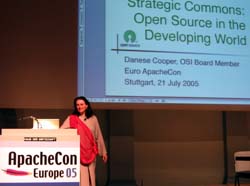Danese Cooper on open source in the developing world
 We're sitting with Jeremias (who took the picture, thanks) and Joerg Heinicke in Danese Cooper's keynote called Strategic Commons: Open Source in the Developing World.
We're sitting with Jeremias (who took the picture, thanks) and Joerg Heinicke in Danese Cooper's keynote called Strategic Commons: Open Source in the Developing World.
Once again, here are my random notes - just my personal view of her keynote.
The OSI board of directors, of which Danese is a member, has been expanded this year to include people from more continents, aiming to become a more global entity.
Some people think that Open Source is a scary beast: mostly some governments and some big companies.
Link: http://benkler.org/CoasesPenguin.html.
At its core, Open source is about community. Creating commons makes all the difference, but it takes a pyramid of users, contributors, innovators and leaders to happen.
Participation equates to ownership: you don't really get the benefit of open source unless you participate.
Currently, US and Europe are leading in open source. Brazil and some other places are innvoating. Some other areas are contributing and all the rest is just leveraging what is being done by others.
The potential of open source for developing nations is great, but the Tragedy of the Commons should not be forgotten: without participation, those who have the gold make the rules.
People from developing countries do not necessarily have spare time to work on open source stuff on the side: life is harder and free time is scarce. Gift economies are driven by abundance, in poor countries people don't have a hobby: they have neither the time nor the resources, so this takes out a big part of the contributing potential.
It's not easy to find open source success stories that people agree to publish, except in places like Brazil where the government has made a clear statement that open source is a good thing.
FUD works: Danese has seen people all around the world being afraid of embracing (or openly embracing) open source due to irrational or propaganda-related fears. OSI (believe it or not I wrote OSGI first ;-) sees a related proliferation of would-be open source licenses which attempt to fix perceived problems and reinvent all kinds of weird wheels. The translation of licenses, and the adaptation to local laws, is also a problem.
Language is also a barrier obviously: most open source communication happens in english, translators might be needed to avoid a fragmentation of projects.
One of her last slides is What can the Apache community do?
Show up: offer expertise, mentor a OSS developers.
Encourage diversity: local language discussions, special interest groups, non-code contributions.
Continue to build bridges (like in the Harmony project).
More links: http://www.iosn.net/, http://asia-oss.org/, http://english.softwarelivre.org/.